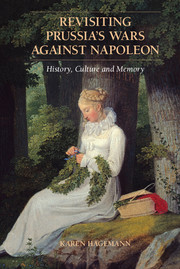Book contents
- Frontmatter
- Epigraph
- Contents
- List of Figures and Maps
- List of Abbreviations
- Acknowledgments
- Revisiting Prussia’s Wars against Napoleon
- Prelude
- Introduction Revisiting the Wars against Napoleon
- Part One A History of Defeat, Crisis and Victory
- Part Two Discourses on the Nation, War and Gender
- Part Three Collective Practices of De/Mobilization and Commemoration
- Part Four Literary Market, History and War Memories
- Part Five Novels, Memory and Politics
- Epilogue Historicizing War and Memory, 2013–1813–1913
- Bibliography
- Name Index
- Subject Index
- Plate section
- References
Introduction - Revisiting the Wars against Napoleon
Published online by Cambridge University Press: 05 March 2015
- Frontmatter
- Epigraph
- Contents
- List of Figures and Maps
- List of Abbreviations
- Acknowledgments
- Revisiting Prussia’s Wars against Napoleon
- Prelude
- Introduction Revisiting the Wars against Napoleon
- Part One A History of Defeat, Crisis and Victory
- Part Two Discourses on the Nation, War and Gender
- Part Three Collective Practices of De/Mobilization and Commemoration
- Part Four Literary Market, History and War Memories
- Part Five Novels, Memory and Politics
- Epilogue Historicizing War and Memory, 2013–1813–1913
- Bibliography
- Name Index
- Subject Index
- Plate section
- References
Summary
In 2013, the media and museums throughout Germany began to mark the bicentenary of the last, ultimately victorious wars against Napoleon in 1813–15, which are usually referred to as the “Wars of Liberation.” Several academic conferences have debated the history of the period and a plethora of public events – including a vast reenactment of the central battle at Leipzig in October 1813, lectures, readings and “history festivals” – have recalled the wars. Documentaries and other programs on television, newspapers and magazines, popular history books and bestselling historical novels have re-narrated them. The hype around the anniversaries of the Napoleonic Wars began in 2005 in Britain, occasioned by the anniversary of the Battle of Trafalgar with a major exhibition on Nelson & Napoleon. Exhibitions in Austria, Germany, Italy, Russia and Sweden followed. The most recent include Napoleon and Europe: Dream and Trauma, a Franco-German project that was shown in Bonn in 2011 and in Paris in 2013. It explores “the close connection between the level of expectation that Napoleon created and the deep distress he caused.” This book also emphasizes the ambivalence, frictions, ruptures and contradictions that marked the period of the wars of the Napoleonic Empire and the preceding French Revolution – which raged across and beyond the Continent between 1792 and 1815 – and its legacy. The sometimes sudden and dramatic transformations in the economy, politics, the military and society that characterized this time occurred unevenly across Europe and were accompanied by stagnation and the persistence of tradition in other areas of work and life, particularly in the culture of everyday life and mentalities. Contemporaries had to cope with the coexistence of accelerated change and cultural continuities, and the contradiction between universalist rhetoric and exclusionary practices. These ambivalences also formed the memories of the Napoleonic Wars from 1803 to 1815, which were at once national and European. The nation – defined, following Benedict Anderson, as an “imagined community” – was the main framework in which most memories of these wars were initially constructed and in which they then evolved and circulated. Many European countries recall the era even today as a “formative period” in the history of their nation. This “nationalization” of memory, which is also reflected in the research, is, however, accompanied by the emergence and formation of a “shared and entangled,” specifically European memory of the same wars.
- Type
- Chapter
- Information
- Revisiting Prussia's Wars against NapoleonHistory, Culture, and Memory, pp. 9 - 30Publisher: Cambridge University PressPrint publication year: 2015



